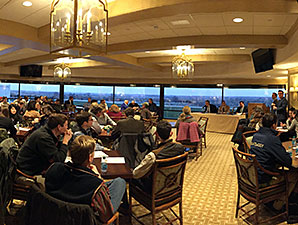Unity Top Topic at Racing Industry Forum


The Thoroughbred industry has made meaningful progress in important areas such as medication, uniformity, and capitalizing on big events, but greater unity is needed going forward, especially if federal legislation on medication and drug-testing is to be achieved.
That was the consensus from a Jan. 10 panel discussion at Keeneland between Glen Hill Farm owner Craig Bernick, Churchill Downs president Kevin Flanery, and Association of Racing Commissioners International chair Mark Lamberth on the topic of "The State of the American Thoroughbred Industry".
"It is going to be very tough to pass any type of legislation because the industry is not together," said Lamberth, a highway contractor who was recently involved with helping pass a federal highway bill that was six years in the making. "When I go to Capitol Hill, they want to know what the other side wants to do. If we're all fractured and looking for a different view, they aren't going to pass it.
"We all have to be on the same page. If medication reform is the big issue, how are we going do that? We have to get together sooner rather than later if we are to move forward."
Lamberth, also a horse owner in Arkansas and a former board member of the Arkansas Horsemen's Benevolent and Protective Association, said the proposed Thoroughbred Horseracing Integrity Act of 2015, which would set up a mechanism for federal oversight of equine medication and drug-testing, "in its present form doesn't have much of a chance of passing."
Flanery and Bernick agreed with Lamberth's assessment that the current legislation is not passable.
"I would love to have (federal legislation) to move the industry forward, but when your racetracks are against it, your racing commission—which are appointed by governments—are against it, and your horsemen are against it... the answer needs to come from within, so that when we go to the federal government, we are all at least on the same page," Bernick said. "Right now it's a lot of reiterating everybody's position and not seeing a big reason to compromise."
"We're not opposed to federal legislation, but it has to be the right legislation—something that is good for the industry," said Flanery, adding that Churchill would want to make sure that any federal legislation restricts itself to the area of medication and does not do anything to amend the Interstate Horseracing Act of 1978. "We have made great strides on a lot of medication issues. We have really taken on these medication issues at the state level...and that process needs to continue, whether people are for or against federal legislation, because federal legislation is very hard to pass."
For the most part, the panelists said racing is headed in the right direction, citing positives such as exposure from American Pharoah 's Triple Crown and Breeders' Cup Classic (gr. I) victory last year, racetrack operators' efforts to appeal to younger fans and families, racetrack safety for horses and participants, progress on attaining uniformity of medication and other rules of racing, and the expansion of handicapping tournaments, among others.
But they reiterated that greater cooperation, unity, and compromise are important to the industry's future success.
Lamberth said RCI is scheduling a series of town hall meetings that will bring together all industry stakeholders to "bounce ideas off each other to find where the common ground is. You are not going to get everything you want, so you have to find the areas you agree on and then decide how you're going to get there."
The culmination would be a year-end congress that includes RCI, HBPA, The Jockey Club, veterinarians, and others "to hammer out the reforms we need in this industry."
To make racing more prominent in the greater sports landscape, Bernick suggested fixing it "from within. Make it a better for the people who gamble on it (and) better for the people who own and breed horses. There are a lot of people with a lot of money that could get involved if the sport improved. Our core customer has to be from our existing customer, not from someone who might like horse racing 'if we did these five things.' If we fix for the people involved, I think more people will come into the game from the outside."
Flanery said racing needs to present a product of competitive, full fields attractive to handicappers and to figure out a way to be relevant to the changing fan base.
"It's a different world," the racetrack executive said. "How many people are going to spend six hours on a Saturday afternoon at a racetrack? We have 10 races over a six-hour period, and they are two minutes. So we have 20 minutes of racing over six hours. That customer base has to be entertained."
The panel was presented by Vision 20/20, a part of the Kentucky Thoroughbred Association, and moderated by Lucas Marquardt.
